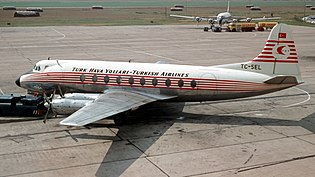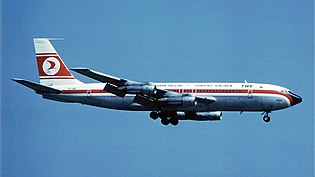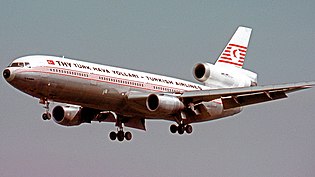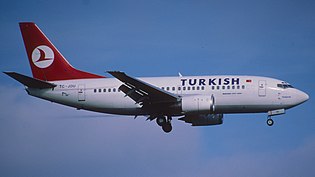Turkish Airlines fleet
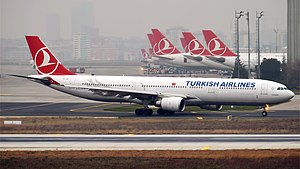
As of April 2024[update], Turkish Airlines operates a fleet of 365 Airbus and Boeing aircraft. The airline started its operations in 1933 with only five planes. In 1945, the airline bought over 30 cheap Douglas DC-3 and Douglas C-47s used in the Second World War from the United States of America. The DC-3s had numerous issues regarding their safety but remained in the fleet until 1967. The first jet-engined aircraft, a leased McDonnell Douglas DC-9, joined the fleet in the same year. In 1972, several McDonnell Douglas DC-10s were acquired, becoming the first wide-body aircraft of the carrier. Fokker F28 Fellowships also joined the fleet the same year. Boeing 727s were added two years later. With the Airbus A310 joining in 1985, Douglas DC-10 and Fokker F28s were transferred to Boğaziçi Hava Taşımacılığı to standardize the fleet. After evaluating the Boeing 747, McDonnell Douglas MD-11 and the Airbus A340, the carrier chose the latter as the replacement of the DC-10.
The Boeing 737-400 was added in 1991, and the first Airbus A340 in 1993. The same year, the carrier also received Avro RJ100s to fly domestic airports with limited infrastructure, replacing the Douglas DC-9. Six Boeing 737-800 joined in 1998. The fleet size remained nearly constant from 1995 to 2003. In 2004 and 2005, the airline ordered almost 60 aircraft from Airbus and Boeing. Avro RJ aircraft with high operating costs were removed from the fleet. From 2003 to 2008, the airline almost doubled its fleet size from 65 to 120 aircraft. In 2008, Turkish Airlines started leasing Airbus A320 and Boeing 737 Next Generation aircraft. The airline also leased three Boeing 777-300ER's the same year. In 2010, 40 narrow-body jets were ordered.
In 2013, the airline announced a record order for 117 Airbus aircraft, including jets from the new Airbus A320neo family. The next month, Turkish Airlines also ordered 60 Boeing 737 MAX aircraft. Two years later, an additional 20 aircraft from the Airbus A320neo family were ordered. During the winter of 2016, the carrier grounded 30 aircraft due to a downfall in traffic. In March 2018, Turkish Airlines finalized its order for 25 Boeing 787 and 25 Airbus A350 aircraft. In 2019, the airline announced that it was interested in the Airbus A220 and Embraer E190/E195. Due to the impact of the COVID-19 pandemic, Turkish Airlines grounded over 100 aircraft in the winter of 2020. A few months later, the carrier cancelled an order for 40 Boeing 737 MAX aircraft. Since 2021, the carrier has been removing the Airbus A330 aircraft from its fleet, which are being replaced by the newer aircraft. Turkish Airlines announced its plans to order 600 new aircraft in 2023, though no firm order was placed.
Aircraft in the fleet of Turkish Airlines are named after districts, provinces, rivers and tourist places of Turkey, with some leased planes having no name. Since 2010, the airline has used a predominantly white livery with blue lettering, a grey tulip stretching from the middle to the end of the aircraft fuselage and a red tail which includes the company logo inside a circle. Turkish Airlines also operates several Airbus aircraft which have a special livery, and as a member of Star Alliance, also aircraft with the alliance livery.
Fleet development[edit]
Early years and post-war period[edit]
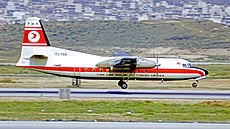
Turkish Airlines started its operations on 20 May 1933 with a total of five aircraft: two Curtiss Kingbird, two Junkers F 13 and one Tupolev ANT-9.[1] The Tupolev ANT-9, the largest plane, was gifted to Turkey by the Soviet Union. The first flight of the airline was operated by one of the Curtiss Kingbirds.[2] These aircraft were removed from the fleet in 1936 and were replaced by four de Havilland Dragon Rapide and four de Havilland Expresses.[3] The fleet development was low in the early-1940s,[4] and its size had remained the same until 1943, when the carrier added six de Havilland Dominies, the military version of the Dragon Rapide, to its fleet.[5] Five Junkers Ju 52 joined a year later in 1944.[6]
In late-1945, the airline bought 30 Douglas DC-3 and three Douglas C-47 aircraft.[7] These aircraft were used during the Second World War by the United States of America and were located in Cairo, Egypt. Pan Am had assisted the airline in the purchase of these aircraft as well as the training of pilots.[8] Many had faults, which led to their price being very low. The aircraft entered service in 1946 after each went through maintenance.[9] The purchase increased the fleet size of the carrier to 52 aircraft,[1] thereby making it the largest airline in the Middle East.[10] The interior of these aircraft, which were configured to the needs of the war when bought, were refurbished between 1946 and 1950 at the Turkish Aeronautical Association maintenance centre in Etimesgut Air Base.[11] The fleet size dropped to 33 in 1947, as only the Douglas DC-3 and Douglas C-47s were kept and other types were removed.[12] Only one C-47 was left by 1954, which was removed in 1955.[13] Two C-47s were added back in 1957.[14]
In 1950, only 14 of the 33 aircraft were in operation; spare parts including engines were ordered from the United States to repair the rest.[15] In the mid-1950s, the number of Douglas DC-3s of the airline dropped to 16, several of which were inoperative. Seven were considered to be hangar queens that required a lot of maintenance, while five were getting revised in the Netherlands by Fokker. Due to financial difficulties, four planes were stuck in the Netherlands, from which point the airline started revising the DC-3s on its own. This turned out to be faster and significantly cheaper.[16] In 1956, seven de Havilland Herons joined the fleet,[7] but were removed three years later in 1959.[17] In 1958, five Vickers Viscounts were added to the fleet,[18] followed by six Fokker F27 Friendships in 1960.[17] Douglas DC-3 and C-47s kept flying until 1967.[19]
Start of the jet age[edit]

From 1959 onwards, major airports in Turkey were overhauled to be able to accommodate jet-engined aircraft.[20] In 1965, Turkish Airlines started a search for a jet aircraft to expand its fleet. Four types were initially considered for evaluation: BAC One-Eleven, Hawker Siddeley Trident, McDonnell Douglas DC-9 and Sud Aviation Caravelle VI.[21] The Caravelle was quickly ruled out as it had crashed in Ankara a few years prior. A Trident was wet leased from British European Airways for a brief period but was found to be insufficient. In later stages, the Soviet Tupolev Tu-134 was offered as well to the airline by its manufacturer. The management decided to order the McDonnell Douglas DC-9 in 1966.[22] Management wanted to order three aircraft of the type but ordered two and leased one instead due to financial restrictions.[23] The leased Douglas DC-9-10 registered as TC-JAA joined the fleet next year and became the first jet-engined aircraft of Turkish Airlines, and was due to stay until the newly bought Douglas DC-9-30s were delivered.[24] Initially, the idea was to have the plane registered as TC-NAZ, but this was later changed, with the "J" in the registration denoting that it was a jet-engined aircraft; this practice was used in later aircraft as well.[25] One Douglas DC-7 was also leased from Sweden for a single year to meet the increasing passenger demand.[22] The next year, the carrier received two Douglas DC-9-30 aircraft.[26] Two more Douglas DC-9s were added to the fleet in 1969, followed by an additional four in 1970.[27] In 1971, the Vickers Viscounts were removed from the fleet.[26] In the same year, three Boeing 707s were leased to meet the increasing demand.[7][28]
Wide-body operations and all-jet fleet[edit]
A commission of Turkish Airlines released a report to choose the first wide-body aircraft of the airline in December 1971. In the report, the Douglas DC-10-10 was ranked the highest, the Lockheed L-1011 TriStar was second, while the Airbus A300 came third.[28] A final report in July 1972 advised against the L-1011 TriStar due to its existing engine problems. Talks with McDonnell Douglas began in August.[29] In the same month, Lockheed Corporation sent Turkish Airlines an offer for the L-1011 TriStar.[30] A committee from the manufacturer arrived at Istanbul to discuss a potential order. The discussion on 25 August resulted in the price of the planes being lowered to 17 million dollars per unit. Its competitor, the Douglas DC-10-10, had an earlier delivery date but was 900,000 dollars more expensive per unit.[31] On 25 September 1972, the general directorate placed an order for three Douglas DC-10-10s.[32]
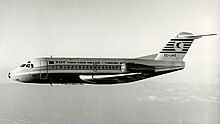
Between 1972 and 1973, five Fokker F28 Fellowships were added to the fleet,[7] the latter of which replaced the Fokker F27s, making the fleet fully consist of jet-engined aircraft.[33] Another Fokker F28 was leased and returned to Fokker after 42 days of service. The type was bought due to some short runways not being able to accommodate larger jets. The Fokker F27s were sold back to the Netherlands to pay for the new aircraft.[34] The leased Douglas DC-9-10 stayed in the fleet until 1973.[25] Four Boeing 727 aircraft joined a year later in 1974.[7] Three of the Fokker F28 Fellowships were declared hull losses after accidents in 1974, 1975 and 1979,[35] while the two remaining aircraft later crashed as Air Ontario Flight 1363 and Iran Aseman Airlines Flight 746.[36] Between 1969 and 1975, the number of aircraft of Turkish Airlines increased from 16 to 21.[37] The airline was hit significantly by the Turkish invasion of Cyprus in 1974.[38]
1980s[edit]
By 1984, Turkish Airlines had three de Havilland Canada Dash 7, five Boeing 707s, two Fokker F28 Fellowship, nine Douglas DC-9s, nine Boeing 727s, and two Douglas DC-10 aircraft.[39] The fleet was made up of unrelated planes which weren't able to meet the demand of the flight network Turkish Airlines had.[40] In the 1980s, the airline made planes to order the Airbus A310, Boeing 757 or Boeing 767, with the Minister of Transport and Infrastructure Veysel Atasoy leading the negotiations. The Airbus A310 had more cargo capacity and Airbus provided a discount, which led to the type being chosen. Initially, the Board wanted to place a firm order for three and have two options, but this was later increased to seven of each.[41] Four Airbus A310s joined the fleet in 1985, followed by three more in 1988.[42] Within 7 years, a total of 14 Airbus A310s were added to the fleet.[35] The de Havilland Canada Dash 7s were returned to their lessors after their contracts ended in 1986, marking the end of propeller aircraft operations of the airline.[2] In 1987, the Douglas DC-10, Fokker F28, as well as two Boeing 707 aircraft were transferred to the newly formed subsidiary Boğaziçi Hava Taşımacılığı (BHT) to standardize the fleet of Turkish Airlines.[43][39] From 1988 to 1989, plans were made to make changes to the fleet in order increase the productivity of the aircraft.[44] The main idea was to decrease the amount of types operated.[45]
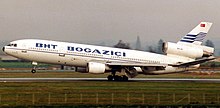
The company wanted to remove the Douglas DC-10-10s, still operated by BHT, as soon as possible since they often had faults which were difficult to fix, and their large capacity made them difficult to fill during the winter. Additionally, if one were to have an extensive maintenance check, the flight network would become hampered as two aircraft were needed to fill in for one DC-10. The demand for the type as a passenger aircraft was falling, but cargo variants still had customers. The first and only airline interested in the two planes was FedEx, which eventually bought the planes and a spare engine. As a replacement for the DC-10, the Board of Directors considered the McDonnell Douglas MD-11 and Airbus A340, both of which were in the development phase.[35] Turgut Özal, the 8th President of Turkey, wanted the airline to have the Boeing 747-400, and the Ministry of Transport and Infrastructure sent an official letter asking for the type to evaluated. The board came to the conclusion that adding the 747 would hurt the company even more, as the seasonal traffic of the airline meant that the type wouldn't hit the 80–90% load factor needed to break-even during the low season.[46]
1990s[edit]
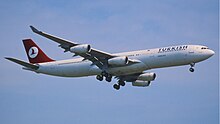
The result of the fleet plannings made during the previous decade showed its results in the 1990s.[47] In January 1990, an internal commission set up to decide on the replacement of the Douglas DC-10 did its final voting after several rounds, and the Airbus A340 was unanimously chosen instead of the McDonnell Douglas MD-11 due to its technical advantages and cost benefits. A few days later, CEO Cem Kozlu explained the decision to Turgut Öcal, who only accepted it after Kozlu became a guarantor.[48] Öcal brought up the Boeing 747 again several months later, when the Gulf War started. Kuwait Airways had four aircraft of the type, which were stored in Egypt due to the conflict. He asked Kozlu to lease the type until the conflict was resolved. By the time the complicated loan and insurance-related affairs had been arranged, the conflict had turned into a war, and plans were abandoned.[49]
Around the same time, the commission also had to decide between the Boeing 737 Classics and the Airbus A320, with the latter being favoured by a slim margin. In the end, the Boeing 737 was chosen because the Airbus A320 had later delivery dates and new technical features that were difficult to fix in case a plane broke down at airports in Anatolia without adequate technical infrastructure. The company also didn't want to drift completely away from Boeing, with the majority of the airline's orders going to Airbus around that time.[50] An additional two Airbus A310s were delivered to the airline in 1990 and 1992, bringing the number of aircraft in its fleet to 32.[51] The Boeing 737 Classics were first delivered in 1991.[47] A further six Boeing 737-400 and two smaller Boeing 737-500s joined the fleet a year later in 1992.[52] The first Airbus A340-300 aircraft was delivered in 1993, which enabled the airline to fly to destinations in East Asia, such as Tokyo.[47] The fourth A340, registered TC-JDM, would become famous in the country for its strange unreliability, and was nicknamed Deli Mike.[53]
Turkish Airlines received its first Avro RJ100 aircraft in July 1993, with Prince Charles in attendance. With its four engines, the aircraft was used to fly domestic flights to East and Southeast Anatolia, where most airports had short runways. After being satisfied with the aircraft, the airline ordered five more RJ100s and four RJ70s, the shorter variant, in 1995. RJ70 aircraft were bought because of their modified landing gear that allowed the type to land on unpaved runways, which made it possible for the airline to carry soldiers of the Turkish Army. The initial problems with the engines leaking oil were fixed with modifications made by Turkish Technic.[54] The Boeing 727s, all of which were converted to cargo aircraft, were retired from the fleet in 1996.[52] During Turkish president Süleyman Demirel's visit to France in February 1998, Turkish Airlines ordered two additional Airbus A340s, bringing the total to seven aircraft of the type.[55] In November 1998, the airline added six Boeing 737-800, a Next Generation variant, to its fleet.[52] The planes landed back to back at Atatürk Airport on 2 November, making it the first time in Turkish aviation history that six aircraft were delivered on the same day. The first plane on approach made a go-around, which is a tradition.[56] By 1999, the total number of aircraft in the fleet had risen to 75.[57]
2000s[edit]
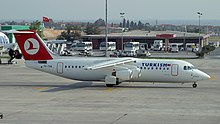
Seven Airbus A310s and three Boeing 727s were put up for sale. One of each type was sold by 2001. In 2000, one option for the Airbus A340 was turned into a firm order. From 2000 to 2002, the airline received 11 Boeing 737-800 aircraft.[58] Turkish Airlines sold six Airbus A310s to Iran Air around 2002. Later that year in September, Mahan Air bought seven Airbus A310s from the carrier.[59] In 2004, Turkish Airlines announced an order for five Airbus A330, 19 Airbus A320 and 12 Airbus A321 aircraft. Throughout 2004 and 2005, the airline ordered 23 Boeing 737-800 aircraft. The deliveries were completed in late 2008. Many older aircraft like 11 Avro RJs, five Boeing 737-400 and two Boeing 737-500 aircraft were removed from the fleet. Three passenger Airbus A310 aircraft were converted into freighters.[60] The Avro RJs were planned to be removed in late 2003 specifically due to their low capacity and high operating costs.[61] The ten-year leasing deal ended in May 2004 for several aircraft. During a regular maintenance check on the second aircraft before being sent back, signs of corrosion were found inside the fuel tanks, which led to the seven other Avro RJ aircraft still operating in the fleet being grounded.[54] The final Avro RJ left the fleet in December 2006. A camel was slaughtered at the Turkish Technic maintenance hangar in Atatürk Airport during the farewell ceremony to celebrate the removal of the type.[62] The number of aircraft in the fleet reached 100 in that same year.[63]
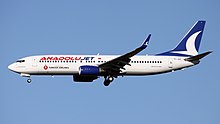
Having almost doubled its fleet size from 65 to 120 in five years and not ordered any aircraft since 2005, Hürriyet reported in October 2008 that the airline was planning to order up to 25 wide-body and 50 narrow-body aircraft. The Airbus A330 aircraft ordered four years prior only replaced older Airbus A310 aircraft, meaning that Turkish Airlines didn't have a significant growth in its long-haul fleet. The carrier also leased four Boeing 737-700 aircraft to replace the older 737-400 variant which didn't have their leasing agreement renewed.[64][65] In addition, a total of 21 leased aircraft joined the fleet in 2008, with the majority being the Airbus A320 family and Boeing 737 Next Generation aircraft, but also four wide-bodies.[60] In April 2008, the airline founded AnadoluJet as a trademark and transferred five of its Boeing 737-400s to it. AnadoluJet is not a separate company and operates under Turkish Airlines.[66] By November 2008, the airline had converted three of its Airbus A310s into freighters.[67] Two planes of the type were sold to Ariana Afghan Airlines in April 2009.[68] Turkish Airlines leased three Boeing 777-300ER aircraft from Jet Airways in December 2008.[69] In April 2009, Turkish Airlines announced that it had ordered five Boeing 777-300ER aircraft. In July the same year, additional seven aircraft were ordered, bringing the total to 12.[70][71] In November 2009, the airline ordered three Airbus A330-300 aircraft, bringing the total number ordered to ten. Turkish Airlines also signed a memorandum of understanding with Airbus for two Airbus A330-200F freighters.[72]
2010s[edit]
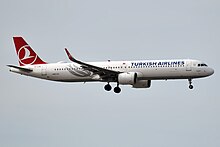
In October 2010, Turkish Airlines announced an order for 14 Airbus A321-200 and six Airbus A319-100 aircraft.[73] A month later, the airline announced an order for ten Boeing 737-800 and ten Boeing 737-900ER planes, with an option for 15 more aircraft.[74] In March 2011, the airline ordered an additional ten Airbus A321-200 and three Airbus A330-200F aircraft.[75] Its 200th aircraft was a Boeing 737-900ER and joined the fleet in 2012.[76] In March 2013, the airline announced an order for 117 Airbus aircraft, which became the largest order placed by a Turkish airline. The order included 25 Airbus A321-200, four Airbus A320neo and 53 Airbus A321neo aircraft as well as an option for 35 further A321neos.[77] The next month, Turkish Airlines placed a firm order for 20 Boeing 737-800, 50 Boeing 737 MAX 8 and ten Boeing 737 MAX 9 aircraft. The order also included an option 25 more 737 MAX 8s.[78] Of the options, 15 were turned into firm orders in June 2014.[79] In December 2014, the A320neo orders were converted into A321neos, and eight A321neo options were turned into firm orders.[80] In December 2015, the carrier ordered an additional 20 Airbus A321neo aircraft, bringing the total amount ordered to 92.[81]

During the winter period following the 2016 Turkish coup attempt, the airline saw a heavy downfall in passenger numbers, which caused it to ground 30 aircraft.[82] On 14 February 2017, Turkish Airlines announced that it had reached an agreement with Boeing to convert its order for two Boeing 777-300ER aircraft to Boeing 777-200F, the freighter variant.[83] In September 2017, Turkish Airlines signed a letter of intent to purchase 25 Boeing 787-9 aircraft, which included an option for further five.[84] Both 777 freighters were delivered to the airline in December 2017.[85] At the end of the same month, three more 777Fs were ordered.[86] In January 2018, the airline signed a memorandum of understanding with Airbus to acquire 25 Airbus A350-900 aircraft and five options.[87] The Boeing 787 and Airbus A350 deal was finalized two months later and the airline officially ordered the two types in March 2018.[88] On 25 November 2018, the airline ordered three more Boeing 777 freighter aircraft.[89] As of December 2018,[update] the airline owned 37 of the 330 aircraft it operated, with the rest being leased. Of the leased aircraft, 207 were on long-term and 87 were on short-term contracts.[90] Throughout 2018, 11 aircraft of the Airbus A320 family had extensive cabin renewals, while 12 Boeing 737-800s were transferred to subsidiary AnadoluJet.[91]
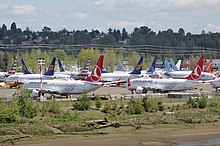
On 12 March 2019, following the request of the Directorate General of Civil Aviation, Turkish Airlines grounded all of its 12 Boeing 737 MAX aircraft. Some aircraft that departed a few hours before the decision had to return to Istanbul Atatürk Airport.[92] Turkish Airlines also did not take delivery of a further 12 737 MAX aircraft due to the global grounding, causing the planes to be stored at the Boeing Field.[93] The final Airbus A340-300 left the fleet in April 2019.[94] On 26 June 2019, the airline received its first Boeing 787-9 registered TC-LLA. The aircraft was welcomed at Istanbul Airport with a ceremony attended by Turkish media.[95] The first commercial flight with the type was flown on 8 July to Trabzon Airport.[96] In August 2019, Turkish Airlines chairman İlker Aycı stated that the carrier was looking into receiving its orders of long-haul aircraft, such as the Airbus A350-900, earlier than planned. In addition, he said that the airline was interested in the Airbus A220 and Embraer E190/E195 to serve new destinations.[97] On 31 December 2019, it was reported that Turkish Airlines received a compensation of around $225 million from Boeing due to the 737 MAX groundings.[98]
2020s[edit]
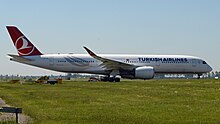
Due to the reduction in air traffic caused by the COVID-19 pandemic, chairman İlker Aycı told Hürriyet on 27 May 2020 that the airline might delay the deliveries of new wide-body aircraft.[99] The airline received its first Airbus A350-900 in October 2020,[100] while the aircraft was completed almost a year before delivery.[101] At the end of 2020, the airline grounded 25 wide-body and 55 narrow-body aircraft due to the start of the winter, but later grounded a further 21 Boeing 737-800 aircraft, which increased the total number of grounded Turkish Airlines aircraft to over 100.[102] Turkish Airlines started using its Boeing 737 MAX aircraft again on 12 April 2021, with a domestic flight from Istanbul Airport to Ankara Esenboğa Airport.[103] Three days after the re-introduction however, Turkish Airlines cancelled an order for 10 737 MAX 8 aircraft and turned 40 firm orders into options which had to be activated before 21 December 2021, leaving a total of 25 firm orders.[104] The airline is also continuing to return Airbus A330-200 aircraft to lessors to simplify its fleet.[105]
On 12 January 2022, the airline received its 20th and final Boeing 737 MAX 8 it had directly ordered from Boeing.[106] In April 2022, the carrier announced that it was going to lease seven Boeing 737 MAX 8 aircraft to join the fleet for the summer period.[107] In May 2022, the carrier took delivery of an Airbus A350 that was originally destined for Aeroflot, which did not go through due to sanctions placed on the airline as the aftermath of the Russian invasion of Ukraine.[108] Similarly, AnadoluJet took delivery of Airbus A320neo, A321neo and Boeing 737 MAX aircraft initially destined for S7 Airlines.[109] The airline showed interest in the Airbus A220 and Embraer E190/E195 again before the 2022 Istanbul Airshow in October, where both manufacturers presented their planes.[110] However, the carrier is hesitant to place an order for the types due their engines. Both aircraft use engines from the Pratt & Whitney PW1000G family. The Airbus A321neos of the airline already use the PW1100G, a member of the family, which has had reliability problems.[111] As of 2023[update], Turkish Airlines is the largest operator of the Airbus A330ceo.[112]
Turkish Airlines received its 400th aircraft, an Airbus A350-900, in February 2023.[113] In May, chairman Ahmet Bolat revealed that the airline was closing in on ordering 600 new aircraft from both Boeing and Airbus, which would be the largest ever if confirmed. 400 of these aircraft would be narrow-body while the other 200 would be wide. Bolat additionally said that the airline would operate over 800 airplanes by 2033.[114] The order was supposed to be confirmed during the International Air Transport Association annual meeting held in Istanbul in June, but was delayed by two months due to the 2023 Turkish general election.[115] The order was delayed once again in August, this time due to issues with engine options and the evaluation of maintenance contracts.[116] In the meantime, the carrier announced that it had reached an agreement to lease 25 Boeing 737 MAX 8s and 3 Boeing 787-9s from AerCap in October[117] and a further 20 narrow-bodies and one wide-body in November.[118] In December, Turkish Airlines and Airbus announced that they had reached an agreement for a firm order of 230 aircraft and an option for further 125. The order included A321NEO's, A350-900s, A350-900F's and A350-1000's.[119]
Current fleet[edit]
As of April 2024[update], Turkish Airlines operates a fleet of 365 aircraft,[a] consisting of 13 passenger aircraft types.[105] The number of aircraft in the fleet is almost evenly split with Airbus and Boeing, with the airline having 54.9% of its aircraft from the latter and 45.1% from the former.[122] Of the operated aircraft, 59.2% are narrow-bodies, while 40.8% are wide-bodies. The average age of all aircraft is 9.3 years.[123] Historically, this list included aircraft of AnadoluJet, which did not have its own air operator's certificate (AOC) and used to operate under the AOC of Turkish Airlines until 2024.[124] In March 2024, AnadoluJet completed its rebranding into AJet and started operating separately from Turkish Airlines under its own AOC.[125]
| Aircraft | In service | Orders | Passengers | Notes | Refs | ||
|---|---|---|---|---|---|---|---|
| C | Y | Total | |||||
| Airbus A319-100 | 6 | — | — | 132 | 132 | [120] | |
| Airbus A320-200 | 16 | — | — | 150 | 150 | ||
| 159 | 159 | ||||||
| Airbus A320neo | 5 | — | — | 186 | 186 | ||
| Airbus A321-200 | 65 | — | 20 | 158 | 178 | ||
| 16 | 164 | 180 | |||||
| — | 194 | 194 | |||||
| Airbus A321neo | 44 | 185 | 20 | 162 | 182 | Aircraft in Airbus Cabin Flex (ACF) configuration. Additional order of 150 with 100 options in December 2023. | [120][81][126][119] |
| Airbus A330-200 | 14 | — | 30 | 190 | 220 | Leased aircraft are being returned to lessors. | [120][105] |
| 22 | 228 | 250 | |||||
| 24 | 255 | 279 | |||||
| Airbus A330-300 | 36 | — | 28 | 261 | 289 | ||
| 40 | 265 | 305 | |||||
| Airbus A350-900 | 18 | 72 | 32 | 297 | 329 | Six orders taken over from Aeroflot, of which at least three will keep their Aeroflot interior. Additional order of 50 with 20 options in December 2023. | [120][127][119] |
| 28 | 288 | 316 | [128] | ||||
| Airbus A350-1000 | — | 15 | TBA | [119] | |||
| Boeing 737-800 | 40 | — | 16 | 135 | 151 | [120] | |
| 12 | 153 | 165 | |||||
| — | 189 | 189 | |||||
| Boeing 737-900ER | 15 | — | 16 | 135 | 151 | ||
| 153 | 169 | ||||||
| Boeing 737 MAX 8 | 23 | 22 | 16 | 135 | 151 | [120][107][117] | |
| Boeing 737 MAX 9 | 5 | — | 16 | 153 | 169 | [120][129] | |
| Boeing 777-300ER | 34 | — | 49 | 300 | 349 | 2 wet-leased to IndiGo. | [120][130] |
| 28 | 372 | 400 | |||||
| Boeing 787-9 | 23 | 7 | 30 | 270 | 300 | Deliveries originally scheduled until 2022, delayed due to quality-control issues. | [120][131][132][117] |
| Turkish Airlines Cargo fleet | |||||||
| Airbus A310-300F | 2 | — | Cargo | Leased from ULS Airlines Cargo. | [120][133] | ||
| Airbus A330-200F | 12 | — | Cargo | [120] | |||
| Airbus A350F | — | 5 | Cargo | Order with 5 purchase rights in December 2023. | [119] | ||
| Boeing 747-400BCF | 2 | — | Cargo | [120] | |||
| Boeing 777F | 8 | — | Cargo | ||||
| Total | 365 | 306 | |||||
Historical fleet[edit]
The former fleet of Turkish Airlines includes the following aircraft:
Naming[edit]

The Douglas DC-7 leased from Sweden arrived in Istanbul on 20 March 1967. It had its initial name—"Malmö"—still on it. When the plane was repainted in the livery of Turkish Airlines, this name was changed to "Istanbul". It was the first aircraft of the airline to get a name. Turkish Airlines planes since then have been given their own name.[22]
Until the 2010s, aircraft operated by Turkish Airlines were named after provinces, rivers and tourist places of Turkey.[160] In 2013, the airline ran out of province names and used 39 touristic places as names following discussions with the Ministry of Culture and Tourism. When 25 more aircraft were set to join, it was suggested to use the names of the Turkish districts as well.[161] The names are written below the cockpit windows. Some leased aircraft do not include a name, despite being painted in the full livery.[162]
Confusion in the naming and registration of Turkish Airlines aircraft arose when the airline leased an Airbus A310 registered as TC-AKP from World Focus Airlines for the summer period of 2004, with AKP being the abbreviation of the Justice and Development Party.[163] Minister of Transport Binali Yıldırım clarified that the registration was given by World Focus Airlines and that the next aircraft Turkish Airlines planned on adding to the fleet were going to be named after Turkish provinces going by their population. He added that registering or naming aircraft after other parties was technically possible.[160]
Symbolic names[edit]

An Airbus A330-200 with registration TC-JNC was renamed in November 2015 after the Japanese city of Kushimoto, whose residents helped the survivors of the sinking Ottoman frigate Ertuğrul.[164] In August 2016, Turkish Airlines announced that it would name eight of its aircraft after neighbourhoods of Turkey which weren't featured yet, in response to the resistance of the citizens of those neighbourhoods in the 2016 Turkish coup d'état attempt.[165][d] The airline started an online survey to name its first Boeing 787 on 26 June 2019, with the options being Perga, Assos, Göbeklitepe and Zeugma.[166] Following widespread reactions on social media requesting the plane to be named after Eren Bülbül, the aircraft was named Maçka, his hometown, instead of the initial four options given.[167]
In September 2019, an Airbus A321neo registered as TC-LSH was named Sivrihisar, a reference to the Sivrihisar Airplane, which was bought by the citizens of the town and gifted to the Turkish Air Force during the Turkish War of Independence.[168] Following the 2023 Turkey–Syria earthquake, the 400th aircraft of the airline was named Tek Yürek, which comes from the Türkiye Tek Yürek campaign to raise money following the disaster. The Airbus A350-900 made its first passenger flight in March 2023 by carrying 275 survivors of the earthquake.[169]
Livery[edit]
During the first 25 years of operation, the aircraft only had a few red stripes on metal colours on the fuselage.[170] The name of the airline was first written on the noses of de Havilland Dragon Rapides.[2] From 1958 onwards, with the arrival of new Vickers Viscount turboprop aircraft, the airline applied a "pyjama"-styled livery with five red stripes.[170] As the airline had no logo at the time, the tail only consisted of a Turkish flag.[2]
In 1959, the airline's CEO Ulvi Yenal decided to hold a competition to select the new logo of Turkish Airlines. The design of Mesut Manioğlu won the competition and was included on the aircraft in 1961, and has remained on the livery ever since with a minor alteration in 1986 to simplify the logo.[171] The greylag goose was chosen because it is one of the few animals that can fly at a high altitude over long distances.[172] If tilted in three specific angles, the logo resembles the letters "T", "H" and "Y", which are the initials of "Türk Hava Yolları", the name of the airline in Turkish.[173]
After the introduction of the goose logo, the "pyjama" livery was altered slightly to include the new logo: a white tail with a white circle including the red emblem.[170] The bellies of the planes had an aluminium finish while the nose was black. The text on the plane read "THY Türk Hava Yolları-Turkish Airlines" on the left side; on the right, the concept was the same with different text reading "Türk Hava Yolları-Turkish Airlines THY".[174][164] The Boeing 707 aircraft introduced in 1971 however, had a slightly different livery for a short period. The four thin stripes were turned into one thick stripe, with the rest of the livery staying largely the same.[170]
In the early 1990s, a new livery was introduced that had a white fuselage with a blue "Turkish Airlines" at the front and a red "THY" near the rear, and a red tail with the company logo in a white circle in the center.[170] In mid-2005, the livery was updated to include a grey "Airlines" text under the blue "Turkish" and a tulip in the same colour was added for the first time on the fuselage running from the rear of the wing to the tail, the latter of which according to CEO Temel Kotil is an important symbol for the airline, with the aim of giving aircraft and employees a "more contemporary image".[175][176] Designed by Cemil İpekçi, the first aircraft to feature the tulip design was delivered to Turkish Airlines on 25 September 2005.[177]

On 4 July 2010, Turkish Airlines revealed its new livery painted on a Boeing 737-800 named Elazığ for the first time. Designed by Bülent Erkmen,[178] the airline's new "Eurowhite" livery features a white fuselage with blue lettering, and a red tail with the company logo in a white circle-outline. The winglet also got the same design as the tail. The grey "Airlines" lettering was moved up next to the "Turkish" text, and the grey belly of the fuselage was kept without a change.[179] The grey tulip on the fuselage was initially removed,[178][179] but newer aircraft are now again delivered with a tulip.[180][181] The paint of the aircraft stays for a minimum of five years before being re-painted.[182]
Special liveries[edit]
Turkish Airlines operates the following aircraft with a special livery:
| Registration | Aircraft | Name | Description | Photo | Refs |
|---|---|---|---|---|---|
| TC-JIZ | Airbus A330-223 | Alacahöyük | Invest in Turkey livery |  | [183] |
| TC-JNB | Airbus A330-203 | Konya | Turkish Olympic team livery |  | [184] |
| TC-JNC | Airbus A330-203 | Kushimoto | Retro livery |  | [164][185] |
| TC-JNM | Airbus A330-343 | Samsun | UEFA Champions League livery |  | [186] |
| TC-JRG | Airbus A321-231 | Finike | Discover the Potential livery | 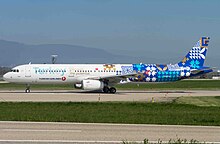 | [187] |
| TC-JRO | Airbus A321-231 | Uludağ | EuroLeague livery |  | [188][189] |
| TC-JSU | Airbus A321-231 | Kalecik | Biofuel livery, applied on the aircraft that made the first biofuel flight of the airline in February 2022 |  | [190][191] |
| TC-JVZ | Boeing 737-8F2 | Beştepe | 6000th Boeing 737 Next Generation aircraft sticker |  | [192] |
| TC-LGH | Airbus A350-900 | Tek Yürek | 400th aircraft of Turkish Airlines |  | [193] |
| TC-LJJ | Boeing 777-3F2ER | — | UEFA Champions League livery |  | [194] |
| TC-LNC | Airbus A330-303 | Refahiye | 300th aircraft of Turkish Airlines |  | [195] |
Notes[edit]
- ^ The number of aircraft listed comes from the website of Turkish Airlines[120] subtracted by the aircraft of AJet.[121]
- ^ The largest amount of the aircraft operated in a year.
- ^ Several aircraft were wet-leased from ULS Airlines Cargo later.[133]
- ^ The eight neighbourhoods are: Beştepe, Saraçhane, Çengelköy, Kavacık, Kazan, Acıbadem, Atışalanı and Gölbaşı.[165]
References[edit]
Citations[edit]
- ^ a b c d e Uğur Aslanhan (19 May 2021). "Türkiye'nin küresel markası THY 88 yaşında". Anadolu Agency. Archived from the original on 20 May 2021. Retrieved 19 January 2022.
- ^ a b c d Gökçen Ata (October 2013). "Pervaneli Yıllar". Skylife Magazine (in Turkish). No. 363. Istanbul: Turkish Airlines. Archived from the original on 7 October 2013.
- ^ Albayrak 1983, p. 33.
- ^ Şekerli 2021, p. 853.
- ^ a b Albayrak 1983, p. 50.
- ^ Yurtoğlu 2016, p. 299.
- ^ a b c d e f g h i j k Ayas 1990, p. 29.
- ^ Mols 2022, p. 6.
- ^ Albayrak 1983, p. 55.
- ^ Şekerli 2021, p. 854.
- ^ Yurtoğlu 2016, p. 301.
- ^ a b c Albayrak 1983, p. 64.
- ^ Albayrak 1983, p. 79.
- ^ Albayrak 1983, p. 93.
- ^ Yurtoğlu 2016, p. 304.
- ^ Albayrak 1983, p. 131.
- ^ a b c d Albayrak 1983, p. 100.
- ^ a b Albayrak 1983, p. 94.
- ^ a b Albayrak 1983, p. 129.
- ^ Yurtoğlu 2016, p. 314.
- ^ Gök 2018, p. 70.
- ^ a b c Gök 2018, p. 71.
- ^ Mols 2022, p. 14.
- ^ a b "Tarihçe". Turkish Airlines. Archived from the original on 29 April 2021. Retrieved 19 January 2022.
- ^ a b Gök 2018, p. 72.
- ^ a b c d Albayrak 1983, p. 142.
- ^ Şekerli 2021, p. 859.
- ^ a b Yalçuk 1973, p. 4.
- ^ Yalçuk 1973, p. 5.
- ^ Yalçuk 1973, p. 1.
- ^ Yalçuk 1973, p. 2.
- ^ Yalçuk 1973, p. 6.
- ^ Albayrak 1983, p. 149.
- ^ Gök 2018, p. 75–76.
- ^ a b c Kozlu 2007, pp. 81–85.
- ^ Gök 2018, p. 131.
- ^ Dinçsoy 1976, p. 23.
- ^ Şekerli 2021, p. 873.
- ^ a b Ayas 1990, p. 70.
- ^ Şekerli 2021, p. 864.
- ^ Kozlu 2007, pp. 86–88.
- ^ Şekerli 2021, p. 863.
- ^ a b Ayas 1990, p. 30.
- ^ Kozlu 2007, p. 70.
- ^ Kozlu 2007, p. 101.
- ^ Kozlu 2007, pp. 94–98.
- ^ a b c d e Şekerli 2021, p. 865.
- ^ Kozlu 2007, pp. 104–106.
- ^ Kozlu 2007, pp. 148–152.
- ^ Kozlu 2007, pp. 107–110.
- ^ Ayas 1990, p. 80.
- ^ a b c d e "Yatırımcı İlişkileri — Tarihçe". Turkish Airlines. Archived from the original on 1 December 2013.
- ^ a b Uğur Cebeci (23 August 2017). "'Deli Mayk' 21 yaşında". Hürriyet. Archived from the original on 9 January 2020. Retrieved 7 January 2022.
- ^ a b c d Uğur Cebeci (16 May 2004). "RJ'leri bakteri perişan etti". Hürriyet. Archived from the original on 3 January 2020. Retrieved 2 February 2022.
- ^ "THY, Fransa'dan 2 Airbus A340 aldı". Hürriyet. 21 February 1998. Archived from the original on 26 March 2022. Retrieved 26 March 2022.
- ^ "THY'den Boeing şov". Hürriyet (in Turkish). 3 November 1998. Archived from the original on 11 September 2022. Retrieved 11 September 2022.
- ^ Sürmeli 2001, p. 49.
- ^ Sürmeli 2001, p. 178.
- ^ "Çöl uçak doldu". Hürriyet. 22 September 2002. Archived from the original on 31 July 2022. Retrieved 31 July 2022.
- ^ a b "THY'nin uçak sayısı 127'ye ulaştı". Dünya. 7 January 2009. Archived from the original on 2 February 2022. Retrieved 2 February 2022.
- ^ Sinan Toros (12 November 2003). "RJ'ler elden çıkarılıyor". Milliyet. Archived from the original on 2 February 2022. Retrieved 2 February 2022.
- ^ a b c Uğur Cebeci (16 December 2006). "Kanlı veda". Hürriyet. Archived from the original on 29 July 2016. Retrieved 2 February 2022.
- ^ Mols 2022, p. 50.
- ^ Uğur Cebeci (12 October 2008). "THY 8.5 milyar dolarlık uçak alacak". Hürriyet. Archived from the original on 11 October 2016. Retrieved 2 February 2022.
- ^ "THY, 737-400'leri elden çıkarıyor". Habertürk. 3 December 2008. Archived from the original on 31 July 2022. Retrieved 31 July 2022.
- ^ Murat Herdem (29 August 2022). "Anadolujet ayrı şirket olmalı mı?". AirportHaber (in Turkish). Archived from the original on 13 October 2022. Retrieved 13 October 2022.
- ^ "THY yolcu uçaklarını kargo uçağına çeviriyor". Habertürk. 16 November 2008. Archived from the original on 31 July 2022. Retrieved 31 July 2022.
- ^ "THY, iki uçağını satacak". Milliyet. 27 April 2009. Archived from the original on 31 July 2022. Retrieved 31 July 2022.
- ^ Tolga Özbek (24 December 2008). "THY'nin ilk Boeing 777'si geliyor". Hürriyet. Archived from the original on 22 January 2022. Retrieved 22 January 2022.
- ^ "THY, Boeing'e 7 uçak sipariş etti". İhlas News Agency. 28 July 2009. Archived from the original on 22 January 2022. Retrieved 22 January 2022.
- ^ "THY'den 1.9 milyar dolarlık Boeing siparişi". NTV. 28 July 2009. Archived from the original on 22 January 2022. Retrieved 22 January 2022.
- ^ "THY 3 adet A330-300 uçağı daha sipariş etti". İhlas News Agency. 6 November 2009. Archived from the original on 2 February 2022. Retrieved 2 February 2022.
- ^ "THY'den dev sipariş". Hürriyet. 4 October 2010. Archived from the original on 9 March 2021. Retrieved 23 January 2022.
- ^ "THY'den bir dev sipariş daha". Hürriyet. 4 February 2010. Archived from the original on 23 January 2022. Retrieved 23 January 2022.
- ^ "THY 13 uçak sipariş etti". Hürriyet. 9 March 2011. Archived from the original on 22 January 2022. Retrieved 22 January 2022.
- ^ Mols 2022, p. 58.
- ^ "THY'den 117 uçak siparişi!". Habertürk. 15 March 2013. Archived from the original on 1 May 2016. Retrieved 22 January 2022.
- ^ "THY'den dev bir sipariş daha". Hürriyet. 9 April 2013. Archived from the original on 23 January 2022. Retrieved 23 January 2022.
- ^ "Boeing ve THY 15 Yeni 737 MAX 8 Siparişini Kesinleştirdi". Boeing Turkey. 16 June 2014. Archived from the original on 1 February 2020. Retrieved 23 January 2022.
- ^ "THY'den yeni uçak siparişi". Dünya. 24 December 2014. Archived from the original on 21 February 2017. Retrieved 22 January 2022.
- ^ a b "THY'den 20 Airbus A321neo siparişi daha". Anadolu Agency. 1 December 2015. Archived from the original on 5 January 2016. Retrieved 23 January 2022.
- ^ Tolga Özbek (7 November 2016). "THY 30 uçağı yere indirdi". Hürriyet. Archived from the original on 13 January 2020. Retrieved 19 January 2022.
- ^ "THY'den 'Boeing 777' kararı". Cumhuriyet. 14 February 2017. Archived from the original on 22 January 2022. Retrieved 22 January 2022.
- ^ "THY 'Dreamliner' siparişi verdi". Deutsche Welle. 22 September 2017. Archived from the original on 7 March 2018. Retrieved 23 January 2022.
- ^ "THY ilk Boeing 777 tipi kargo uçağını aldı". Yeni Şafak. 7 December 2017. Archived from the original on 22 January 2022. Retrieved 22 January 2022.
- ^ "THY 3 kargo uçağı sipariş etti". Cumhuriyet. 27 December 2017. Archived from the original on 22 January 2022. Retrieved 22 January 2022.
- ^ "Turkish Airlines selects A350 XWB, lifting its fleet to new heights". Airbus. 9 March 2018. Archived from the original on 21 January 2022. Retrieved 21 January 2022.
- ^ "THY'nin Boeing ve Airbus'a verdiği uçak siparişleri kesinleşti". Cumhuriyet. 9 March 2018. Archived from the original on 23 January 2022. Retrieved 23 January 2022.
- ^ "THY, üç kargo uçağı alıyor". Yeni Akit. 25 November 2018. Archived from the original on 26 November 2018. Retrieved 22 January 2022.
- ^ Rodoplu, Polat & Kılıç 2019, p. 725.
- ^ Hasekioğlu 2018, p. 27.
- ^ Enver Alas (12 March 2019). "THY'den Boeing 737 Max kararı". CNN Türk. Archived from the original on 13 March 2019. Retrieved 20 January 2022.
- ^ "THY, 2 yıl sonra B737 MAX ile ilk uçuşunu Ankara'ya yapacak". TRT Haber. 14 April 2021. Archived from the original on 10 May 2021. Retrieved 20 January 2022.
- ^ a b "THY'de A340 macerası sona erdi; son uçak da filodan ayrıldı". HavaHaber. 12 April 2019. Archived from the original on 10 July 2022. Retrieved 10 July 2022.
- ^ İzzet Taşkıran (26 June 2019). "THY'nin 'rüya uçağı' İstanbul'da". Anadolu Agency. Archived from the original on 27 June 2019. Retrieved 20 January 2022.
- ^ "THY'nin 'Rüya' uçağı ilk seferini bugün Eren Bülbül için yapacak". Takvim. 8 July 2019. Archived from the original on 28 August 2020. Retrieved 20 January 2022.
- ^ Uğur Cebeci (19 August 2019). "Yeni uçuşlar yakında". Hürriyet. Archived from the original on 21 July 2021. Retrieved 19 January 2022.
- ^ Faruk Can (31 December 2019). "THY Boeing'ten 737 Max tazminatı aldığını duyurdu". Euronews. Archived from the original on 20 January 2021. Retrieved 19 January 2022.
- ^ "Turkish Airlines may delay delivery of Airbus, Boeing planes: report". Reuters. 27 May 2020. Archived from the original on 19 January 2022. Retrieved 19 January 2022.
- ^ Joanna Bailey (19 October 2020). "THY'nin ilk Airbus A350'sinin geliş tarihi belli oldu". AirportHaber (in Turkish). Archived from the original on 11 January 2024. Retrieved 11 January 2024.
- ^ Gökhan Artan and Enver Alas (13 February 2020). "THY birçok yeniliği içinde barındıracak A350 uçağının fotoğrafını paylaştı". Demirören News Agency (in Turkish). Archived from the original on 11 January 2024. Retrieved 11 January 2024.
- ^ "THY, 21 uçağını daha yere indirme kararı aldı". Milliyet. 14 December 2020. Retrieved 19 January 2022.
- ^ "THY'nin ilk Boeing 737-MAX uçağı iki yıl aradan sonra yeniden havalandı". Cumhuriyet. 9 April 2021. Archived from the original on 9 April 2021. Retrieved 19 January 2022.
- ^ "THY, 10 adet Boeing 737-Max siparişini iptal etti". Habertürk. 15 April 2021. Archived from the original on 19 April 2021. Retrieved 19 January 2022.
- ^ a b c Güntay Şimşek (11 October 2021). "THY uçak filosunu sadeleştiriyor". Habertürk. Archived from the original on 27 October 2021. Retrieved 21 January 2022.
- ^ "THY 25'inci B737 Max uçağını İstanbul'a getirdi". AirportHaber. 12 January 2022. Archived from the original on 15 January 2022. Retrieved 21 January 2022.
- ^ a b Uğur Cebeci (2 April 2022). "THY yeniden kurgulanıyor". Hürriyet. Archived from the original on 3 April 2022. Retrieved 4 April 2022.
- ^ "Aeroflot boyamalı A350'ye THY giydirmesi yapıldı". AirportHaber (in Turkish). 8 December 2022. Archived from the original on 12 January 2024. Retrieved 12 January 2024.
- ^ "Turkish Airlines-dochter AnadoluJet breidt Boeing 737 MAX-vloot uit". Luchtvaartnieuws (in Dutch). 28 June 2022. Archived from the original on 12 January 2024. Retrieved 12 January 2024.
- ^ "Airbus ve Embraer THY İçin Kapışacak". AirportHaber (in Turkish). 3 October 2022. Archived from the original on 3 October 2022. Retrieved 10 October 2022.
- ^ Murat Herdem (10 October 2022). "THY, A220 ve Embraer'e neden soğuk bakıyor?". AirportHaber (in Turkish). Archived from the original on 11 October 2022. Retrieved 13 October 2022.
- ^ "Orders and deliveries". Airbus. Archived from the original on 10 February 2019. Retrieved 12 January 2024.
- ^ "THY'nin uçak sayısı 400'e yükseldi". TRT Haber (in Turkish). 26 February 2023. Archived from the original on 1 March 2023. Retrieved 1 March 2023.
- ^ "Turkish Airlines set to order 600 aircraft, chairman says". Reuters. 11 May 2023. Archived from the original on 17 May 2023. Retrieved 4 September 2023.
- ^ Kurt Hofmann (6 June 2023). "Turkish Airlines Delays 600-Aircraft Order By Two Months". Aviation Week. Archived from the original on 4 September 2023. Retrieved 4 September 2023.
- ^ "THY 600 adetlik uçak siparişini motor nedeniyle geciktirecek". Tolga Özbek (in Turkish). 12 August 2023. Archived from the original on 12 January 2024. Retrieved 12 January 2024.
- ^ a b c "THY'nin AerCap'ten kiralayacağı 28 uçağın tipleri belli oldu". Tolga Özbek (in Turkish). 24 October 2023. Archived from the original on 11 November 2023. Retrieved 11 November 2023.
- ^ "THY kapasite artırıyor! 21 uçak kiralayacak". Hürriyet (in Turkish). 9 November 2023. Archived from the original on 10 November 2023. Retrieved 11 November 2023.
- ^ a b c d e "Türk Hava Yolları 355 uçak alımını netleştirdi". Hürriyet (in Turkish). 15 December 2023. Archived from the original on 12 January 2024. Retrieved 12 January 2024.
- ^ a b c d e f g h i j k l m "Fleet". Turkish Airlines. Archived from the original on 4 April 2024. Retrieved 4 April 2024.
- ^ "Hakkımızda". AnadoluJet (in Turkish). Retrieved 4 April 2024.
- ^ CAPA 2024, p. 14.
- ^ CAPA 2024, p. 13.
- ^ "AnadoluJet". Centre for Aviation. Archived from the original on 12 January 2024. Retrieved 12 January 2024.
- ^ "THY'nin yeni markası AJet ilk tanıtım uçuşunu Ankara'dan İstanbul'a yaptı". Dünya (in Turkish). 29 March 2024. Archived from the original on 1 April 2024. Retrieved 5 April 2024.
- ^ "Airbus delivers the first A321neo in Cabin Flex configuration to Turkish Airlines". Airbus. Archived from the original on 7 September 2020. Retrieved 5 September 2019.
- ^ "THY 10 adet geniş gövdeli Airbus siparişi verdi". Dünya (in Turkish). 4 September 2023. Archived from the original on 4 September 2023. Retrieved 4 September 2023.
- ^ "Turkish Airlines nimmt Aeroflot-A350". aero.de (in German). 19 May 2022. Archived from the original on 19 May 2022. Retrieved 19 May 2022.
- ^ Tolga Özbek (15 January 2022). "THY 25'inci 737 MAX'i aldı, teslimat tamamlandı". Tolgaozbek.com. Archived from the original on 15 January 2022. Retrieved 31 March 2022.
- ^ "THY'nin IndiGo Hava Yolları'na personelleriyle birlikte kiraladığı uçak ilk seferini gerçekleştirdi". Dünya (in Turkish). 1 February 2023. Archived from the original on 11 January 2024. Retrieved 11 January 2024.
- ^ Türk Hava Yolları 2018, p. 17.
- ^ Güntay Şimşek (2 January 2023). "THY 2023'te yüzde 17 büyüyecek". Habertürk (in Turkish). Archived from the original on 9 January 2023. Retrieved 11 January 2023.
- ^ a b "Hava kargoda fiyatlar 3 kat arttı". HaberAero. 14 April 2020. Archived from the original on 18 April 2020. Retrieved 31 March 2022.
- ^ a b c Albayrak 1983, pp. 24, 33.
- ^ a b Albayrak 1983, pp. 33, 64.
- ^ Albayrak 1983, p. 52.
- ^ Albayrak 1983, pp. 57, 68, 78, 129.
- ^ Albayrak 1983, p. 57.
- ^ Albayrak 1983, p. 81.
- ^ Albayrak 1983, p. 103.
- ^ a b Albayrak 1983, p. 151.
- ^ Albayrak 1983, pp. 125, 129, 136.
- ^ Albayrak 1983, p. 125.
- ^ Kozlu 2007, p. 100.
- ^ Albayrak 1983, pp. 125, 157.
- ^ Albayrak 1983, p. 139, 151.
- ^ Türk Hava Yolları 1990a, p. 121.
- ^ Türk Hava Yolları 1990b, p. 122.
- ^ a b Ayas 1990, pp. 29, 70.
- ^ Albayrak 1983, p. 146.
- ^ Albayrak 1983, pp. 151, 188.
- ^ Abdullah Nergiz (30 July 2012). "Uçak Satın Alınacaktır". Havayolu101. Archived from the original on 11 August 2020. Retrieved 10 August 2022.
- ^ Albayrak 1983, p. 188.
- ^ a b c Türk Hava Yolları 2002, p. 159.
- ^ "THY A310'la 6 Temmuz'da vedalaşıyor". Kokpit.aero. June 2015. Archived from the original on 13 September 2019. Retrieved 31 July 2022.
- ^ Türk Hava Yolları 2013a, p. 28.
- ^ Türk Hava Yolları 2013b, p. 24.
- ^ Türk Hava Yolları 2004a, p. 189.
- ^ Türk Hava Yolları 2004b, p. 189.
- ^ a b TBMM 2004, p. 220.
- ^ "THY Uçaklarına İsim Teklifi". İhlas News Agency (in Turkish). 12 April 2013. Archived from the original on 12 September 2022. Retrieved 12 September 2022.
- ^ Ian McMurtry (13 November 2016). "How Some Airlines in Europe Play "The Name Game"". Airline Geeks. Archived from the original on 17 September 2021. Retrieved 12 September 2022.
- ^ TBMM 2004, p. 219.
- ^ a b c Faik Kaptan and Murat Çakır (27 October 2015). "THY'den bir ilk, pijama desen ve 'Kushimoto'". Hürriyet. Archived from the original on 19 January 2022. Retrieved 19 January 2022.
- ^ a b "15 Temmuz'un kahraman semtlerinin isimleri THY uçaklarında yaşatılacak". Sabah (in Turkish). 15 August 2016. Archived from the original on 7 May 2017. Retrieved 11 September 2022.
- ^ "THY'nin ilk 'rüya uçağı' yarın İstanbul'da! İsmi için anket başlattı". Hürriyet. 26 June 2019. Archived from the original on 14 October 2021. Retrieved 20 January 2022.
- ^ İzzet Taşkıran (27 June 2019). "THY'nin 'rüya uçağı'na 'Maçka' ismi verildi". Anadolu Agency. Archived from the original on 28 June 2019. Retrieved 20 January 2022.
- ^ "İşte THY'nin yeni uçağına verilen isim: Sivrihisar! THY neden "Sivrihisar" ismini verdi?". A Haber (in Turkish). 23 September 2019. Archived from the original on 27 November 2020. Retrieved 11 September 2022.
- ^ Cevdet Özdemir (4 March 2023). "THY'nin 'Tek Yürek' isimli 400'ncü uçağının özel yolcuları". Sabah (in Turkish). Archived from the original on 4 March 2023. Retrieved 4 March 2023.
- ^ a b c d e Uğur Cebeci (18 December 2005). "Gökyüzünde THY renkleri". Hürriyet. Archived from the original on 10 November 2018. Retrieved 21 February 2022.
- ^ Güntay Şimşek (28 October 2018). "THY'nin Yaban Kazı ne anlama geliyor?". Habertürk. Archived from the original on 2 December 2018. Retrieved 21 January 2022.
- ^ "THY'nin logosunun anlamını biliyor musunuz?". Sabah. 23 June 2015. Archived from the original on 15 August 2017. Retrieved 21 January 2022.
- ^ "Türk Hava Yolları'nın logosundaki mesaj". Yeni Şafak. 23 June 2018. Archived from the original on 6 July 2018. Retrieved 21 January 2022.
- ^ Tuncer Cengiz (27 October 2015). "THY uçağına 'nostaljik' boya". İhlas News Agency. Archived from the original on 3 June 2018. Retrieved 19 January 2022.
- ^ Uğur Cebeci (26 June 2005). "Uçaklar lale açacak". Hürriyet. Archived from the original on 10 November 2019. Retrieved 19 January 2022.
- ^ "THY uçaklarına lale motifi". Hürriyet. 30 June 2005. Archived from the original on 19 January 2022. Retrieved 19 January 2022.
- ^ "Lale gökyüzüyle tanıştı". Hürriyet. 25 September 2005. Archived from the original on 3 May 2022. Retrieved 19 January 2022.
- ^ a b "THY'de lale devri sona erdi". AirportHaber. 5 July 2010. Archived from the original on 2 May 2017. Retrieved 19 January 2022.
- ^ a b Uğur Cebeci (4 July 2010). "THY yeni boya ile uçtu". Hürriyet. Archived from the original on 19 January 2020. Retrieved 19 January 2022.
- ^ "THY 125. Boeing uçağı "737-900 ER'i filosuna kattı". TRT Haber. 12 May 2015. Archived from the original on 27 August 2015. Retrieved 19 January 2022.
- ^ "İşte THY'nin 'rüya uçağı'nın özellikleri". NTV. 27 June 2019. Archived from the original on 1 July 2019. Retrieved 19 January 2022.
- ^ İzzet Taşkıran (11 April 2018). "THY uçaklarının boyanma öyküsü". Anadolu Agency. Archived from the original on 19 January 2022. Retrieved 19 January 2022.
- ^ İzzet Taşkıran (17 November 2015). "THY'nin 'Türkiye'ye yatırım yapın' logolu uçağı tanıtıldı". Anadolu Agency. Archived from the original on 19 November 2015. Retrieved 19 January 2022.
- ^ "THY milli sporcuları Tokyo Olimpiyatları'na taşıdı". Haber.aero. 17 July 2021. Archived from the original on 16 July 2021. Retrieved 19 January 2022.
- ^ "THY'nin "Kushimoto" uçağı Tokyo'da!". Sabah. 20 November 2015. Archived from the original on 17 October 2017. Retrieved 19 January 2022.
- ^ "THY'nin UEFA Şampiyonlar Ligi temalı uçağı gökyüzüyle buluştu". Yeni Akit. 2 January 2022. Archived from the original on 3 January 2023. Retrieved 3 January 2022.
- ^ "THY'nin "Discover the Potential-Turkey" uçağı tanıtıldı". TRT Haber. 8 January 2016. Archived from the original on 16 March 2016. Retrieved 19 January 2022.
- ^ "THY uçağı Euroleague renklerine boyandı". Hürriyet. 6 May 2017. Archived from the original on 14 June 2017. Retrieved 19 January 2022.
- ^ İbrahim Yıldız (6 May 2017). "THY uçağı Euroleague renklerine boyandı". Fanatik. Archived from the original on 19 January 2022. Retrieved 19 January 2022.
- ^ "THY'nin biyoyakıt giydirmeli uçağı göklerde". AirportHaber. 27 April 2022. Archived from the original on 29 April 2022. Retrieved 29 April 2022.
- ^ Uğur Cebeci (2 February 2022). "THY'de biyo yakıtla ilk uçuş". Hürriyet. Archived from the original on 29 April 2022. Retrieved 29 April 2022.
- ^ "THY'nin yeni uçağı geliyor". AirportHaber (in Turkish). 28 July 2016. Archived from the original on 12 March 2023. Retrieved 12 March 2023.
- ^ "THY'nin 400'üncü uçağı hangardan çıktı". AirportHaber (in Turkish). 3 March 2023. Archived from the original on 8 March 2023. Retrieved 12 March 2023.
- ^ "THY'den bir uçağa daha Şampiyonlar Ligi boyaması". AirportHaber (in Turkish). 7 March 2023. Archived from the original on 12 March 2023. Retrieved 12 March 2023.
- ^ Faik Kaptan and Murat Çakır (5 February 2016). "THY'nin 300'üncü uçağı". Sözcü. Archived from the original on 30 November 2017. Retrieved 19 January 2022.
Bibliography[edit]
- Albayrak, İlyas (1983). Dünden Bugüne Türk Hava Yolları: 1933–1983 [Turkish Airlines from Yesterday to Today: 1933–1983] (in Turkish). Turkish Airlines.
- Ayas, İnanç; et al. (May 1990). VI. Beş Yıllık Kalkınma Planı Havayolu Ulaştırması [Sixth Five-Year Development Plan Airline Transportation] (PDF) (in Turkish). Ankara: State Planning Organization. ISBN 9751902436. Archived from the original (PDF) on 9 July 2022. Retrieved 9 July 2022.
- CAPA (January 2024). Turkish Airlines Fast Facts (Report). Centre for Aviation. Archived from the original on 12 January 2024. Retrieved 5 April 2024.
- Dinçsoy, Cahit; et al. (August 1976). IV. Beş Yıllık Kalkınma Planı Havayolu Ulaştırması [Fourth Five-Year Development Plan Airline Transportation] (PDF) (in Turkish). Ankara: State Planning Organization. Archived (PDF) from the original on 21 January 2022. Retrieved 10 July 2022.
- Gök, Kerem (2018). Uçak Kazaları: Türk Sivil Havacılık Tarihine Damgasını Vuran Kazalar [Aircraft Accidents: Accidents That Marked the History of Turkish Civil Aviation] (in Turkish) (First ed.). Ankara: Kanon Kitap. ISBN 9786056864414.
- Hasekioğlu, Orkun; et al. (2018). On Birinci Kalkınma Planı Hava Taşıtları Üretimi ve Bakım Onarımı [Eleventh Development Plan Aircraft Production and Maintenance Repair] (PDF) (in Turkish). Ankara: Ministry of Development. Archived (PDF) from the original on 11 July 2022. Retrieved 12 July 2022.
- Kozlu, Cem (2007). Bulutların Üstüne Tırmanırken: THY, Bir Dönüşüm Öyküsü [Climbing Above the Clouds: Turkish Airlines, a Transformation Story] (in Turkish). Istanbul: Remzi Kitabevi. ISBN 9789751411983.
- Mols, Jozef (2022). Turkish Airlines: The Istanbul Superconnector. Airlines Series. Vol. 4. Stamford: Key Publishing. ISBN 9781802821314.
- Rodoplu, Hakan; Polat, Güler; Kılıç, Doğan (2019). "Uçak Sahipliği Açısından Türk Havacılık Şirketleri Üzerinde Bir Araştırma" [A Research on Turkish Aviation Companies in terms of Aircraft Ownership]. Avrasya Sosyal ve Ekonomi Araştırmaları Dergisi (in Turkish). 6 (1): 92–104. eISSN 2148-9963. Archived from the original on 2 July 2020. Retrieved 10 August 2022.
- Şekerli, Eyüp Bayram (2021). "Kuruluştan Günümüze Türk Hava Yolları'nın Dönüşümüne Yönelik Bir İnceleme" [A Review on the Transformation of Turkish Airlines from its Establishment to the Present]. İnsan ve Toplum Bilimleri Araştırmaları Dergisi (in Turkish). 10 (1): 849–876. doi:10.15869/itobiad.803271. ISSN 2147-1185. S2CID 233554314. Archived from the original on 12 July 2022. Retrieved 12 July 2022.
- Sürmeli, Fevzi; et al. (2001). VIII. Beş Yıllık Kalkınma Planı Havayolu Ulaştırması [Eighth Five-Year Development Plan Airline Transportation] (PDF) (in Turkish). Ankara: State Planning Organization. ISBN 9751927277. Archived from the original (PDF) on 21 January 2022. Retrieved 10 July 2022.
- TBMM (September 2004). "Malatya Milletvekili Ferit Mevlüt Aslanoğlu'nun, THY'nin kiraladığı uçaklara ve isim belirleme kriterlerine ilişkin sorusu ve Ulaştırma Bakanı Binali Yıldırım'ın cevabı (7/3050)" [Malatya Deputy Ferit Mevlüt Aslanoğlu's question regarding the aircraft leased by THY and the criteria for determining the name, and the reply of the Minister of Transport, Binali Yıldırım (7/3050)] (PDF). Millet Meclisi Tutanak Dergisi (in Turkish). 59 (119). Grand National Assembly of Turkey: 218–220. Archived (PDF) from the original on 11 September 2022. Retrieved 11 September 2022.
- Türk Hava Yolları (2013a). 01 Ocak – 31 Aralık 2013 Dönemine İlişkin Yönetim Kurulu Faaliyet Raporu [Board of Directors Activity Report for the Period of 01 January – 31 December 2013] (PDF) (Report) (in Turkish). Turkish Airlines. Archived (PDF) from the original on 8 July 2022. Retrieved 26 September 2022.
- Türk Hava Yolları (2013b). Yıllık Rapor 2013 [Annual Report 2013] (PDF) (Report) (in Turkish). Turkish Airlines. Archived (PDF) from the original on 26 September 2022. Retrieved 26 September 2022.
- Türk Hava Yolları (2018). "Investments, Incentives and Investment Policies" (PDF). 2018 Q1 Board Activity Report. Archived (PDF) from the original on 8 July 2022. Retrieved 10 May 2018.
- Yalçuk, Safa; et al. (February 1973). Türk Hava Yolları Anonim Ortaklığı ile Uçak Servisi Anonim Ortaklığının Durumuna Dair Cumhuriyet Senatosu Araştırma Komisyonu Ek Raporu (10/33) [Additional Report of the Senate of the Republic Research Committee on the Status of Turkish Airlines Joint-Stock and Aircraft Service Joint-Stock (10/33)] (PDF) (Report) (in Turkish). Senate of the Republic. Archived (PDF) from the original on 11 September 2022. Retrieved 11 September 2022.
- Yurtoğlu, Nadir (2016). "Sivil Havacılık Sektörü Içerisinde Yer Alan Türk Hava Yollarının Tarihi Gelişimi (1933–1960)" [Historical Development of Turkish Airlines in the Civil Aviation Sector (1933–1960)] (PDF). Cumhuriyet Tarihi Araştırmaları Dergisi (in Turkish). 12 (23). Hacettepe University: 293–325. ISSN 1305-1458. Archived (PDF) from the original on 19 May 2022. Retrieved 4 August 2022.
Skylife magazines[edit]
- Türk Hava Yolları (October 1990a). "THY Uçak Tipleri ve Özellikleri/Type and Configuration of Aircraft". Skylife Magazine (in Turkish and English). No. 89. Istanbul: Turkish Airlines. p. 121. Archived from the original on 10 September 2022. Retrieved 10 September 2022.
- Türk Hava Yolları (November 1990b). "THY Uçak Tipleri ve Özellikleri/Type and Configuration of Aircraft". Skylife Magazine (in Turkish and English). No. 90. Istanbul: Turkish Airlines. p. 122. Archived from the original on 10 September 2022. Retrieved 10 September 2022.
- Türk Hava Yolları (June 2002). "Uçak Filomuz/The Fleet". Skylife Magazine (in Turkish and English). No. 227. Istanbul: Turkish Airlines. p. 159. Archived from the original on 31 July 2022. Retrieved 31 July 2022.
- Türk Hava Yolları (May 2004a). "Uçak Filomuz/The Fleet". Skylife Magazine (in Turkish and English). No. 250. Istanbul: Turkish Airlines. pp. 188–189. Archived from the original on 10 September 2022. Retrieved 10 September 2022.
- Türk Hava Yolları (June 2004b). "Uçak Filomuz/The Fleet". Skylife Magazine (in Turkish and English). No. 251. Istanbul: Turkish Airlines. pp. 188–189. Archived from the original on 10 September 2022. Retrieved 10 September 2022.
External links[edit]
 Media related to the fleet of Turkish Airlines at Wikimedia Commons
Media related to the fleet of Turkish Airlines at Wikimedia Commons


 French
French Deutsch
Deutsch





